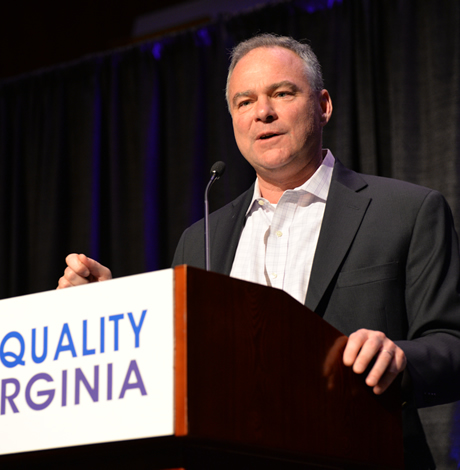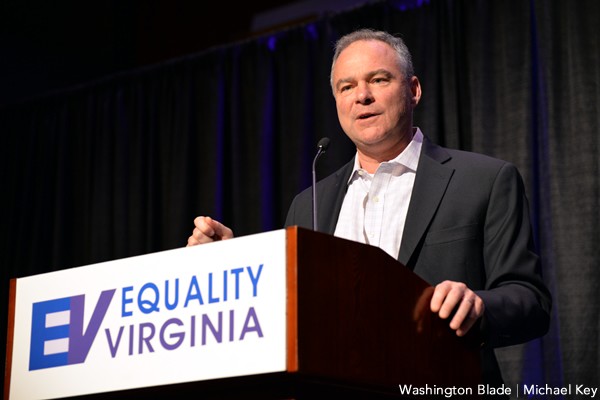News
Clinton’s VP pick Kaine reliable on LGBT rights
Running mate called ‘solidly pro-LGBT equality’ after evolution


Hillary Clinton has selected Sen. Tim Kaine (D-Va.) as her running mate. (Washington Blade file photo by Michael Key)
Hillary Clinton has selected as her running mate a U.S. senator from Virginia who’s been a largely reliable voice in support of LGBT rights.
As first reported by The New York Times, Clinton announced late Friday her choice is Sen. Tim Kaine (D-Va.), who’s also former chair of the Democratic National Committee and former Virginia governor. A Spanish speaker, Kaine is set to make his joint campaign appearance with Clinton on Saturday in Miami.
Since his tenure as Virginia governor between 2006 and 2010, Kaine has taken action on behalf of LGBT rights. Upon taking office, Kaine signed an executive order barring anti-gay discrimination in the state workplace (the direction didn’t contain explicit protections on the basis of gender identity). His Republican successor, Virginia Gov. Bob McDonnell reversed the order, but Gov. Terry McAuliffe, a Democrat, reinstated it and added protections for gender identity.
Upon election to the U.S. Senate in 2012, Kaine generally hasn’t been at the forefront of initiatives advancing LGBT rights, but has rose to the occasion as needed. In the Human Rights Campaign’s most recent congressional scorecard, Kaine scored a “90” out of possible “100,” losing points for not co-sponsoring the Student Non-Discrimination Act and the Safe Schools Improvement Act.
Kaine is an original co-sponsor of comprehensive LGBT non-discrimination legislation known as the Equality Act. The senator also cast votes in favor of the Employment Non-Discrimination Act and an amendment along the lines of the Student Non-Discrimination Act. However, he isn’t a co-sponsor of the Therapeutic Fraud Prevention Act, which seeks to ban widely discredited “ex-gay” therapy nationwide by classifying it as fraud.
Kaine has signed amicus briefs urging the U.S. Supreme Court to overturn the Defense of Marriage Act and state bans prohibiting same-sex marriage. More recently, Kaine signed a brief urging the U.S. Second Circuit Court of Appeals to find sexual orientation discrimination is prohibited under current law.
In 2010, Kaine, as chair of the Democratic National Committee, took part in a three-and-a-half minute video to answer on questions on LGBT rights, outlining accomplishments already made under the Obama administration.
“We have a long way to go, but we’re already making progress for LGBT individuals,” Kaine says. “President Obama and congressional Democrats have already begun to address barriers to equality for LGBT Americans by guaranteeing these families the right to visit and make medical decisions for a partner in America’s hospitals, by enacting hate crimes legislation to protect LGBT Americans — to name just two significant accomplishments.”
Chad Griffin, president of the Human Rights Campaign, drew a stark contrast between Kaine and Indiana Gov. Mike Pence, whom Donald Trump has selected as his running mate.
“While Donald Trump doubled down on discrimination by picking Mike Pence, Hillary Clinton has bolstered her campaign’s historic commitment to LGBTQ equality by choosing Tim Kaine,” Griffin said. “Having proven time and time again that they have the experience, determination, and leadership needed to move equality forward for all Americans, we are confident Clinton and Kaine will tear down the walls of discrimination that hold all of us back.”
But Kaine, like many Americans, including President Obama and Clinton, appears to have gone through an evolution on LGBT rights. When running to become Virginia governor in 2006, Kaine said he didn’t support adoption by gay couples, but reversed his position by 2011.
Kaine was also initially opposed to same-sex marriage. Although he now supports marriage equality, it’s hard to say exactly when he changed his mind. In 2012, he sought to find a middle ground, not yet clearly supporting same-sex marriage, but backing some kind of relationship recognition.
“The underlying issue is, should committed couples have the same legal rights and responsibilities, and the answer to that is an unequivocal yes,” Kaine said, according to The Washington Post.
In 2013, when many U.S. senators declared their newfound support for same-sex marriage, Kaine joined them in declaring his support for marriage equality.
“I believe all people, regardless of sexual orientation, should be guaranteed the full rights to the legal benefits and responsibilities of marriage under the Constitution,” Kaine said at the time. “I hope the Supreme Court will affirm that principle.”
Rick Zbur, executive director of Equality California, said Kaine is “now solidly pro-LGBT equality” after undergoing the same kind ‘evolution’ on LGBT rights as the nation as a whole.
“With her selection of Sen. Tim Kaine, Hillary Clinton has highlighted the stark differences between her ticket and her opponent’s,” Zbur said. “In contrast to the extremes of racism, xenophobia, misogyny, and homo- and transphobia on display this week at the Republican National Convention, Kaine presents an alternative: a pragmatist who works across ideologies and across the aisle to get things done.”
District of Columbia
D.C. police arrest man for burglary at gay bar Spark Social House
Suspect ID’d from images captured by Spark Social House security cameras

D.C. police on Feb. 18 arrested a 63-year-old man “of no fixed address” for allegedly stealing cash from the registers at the gay bar Spark Social House after unlawfully entering the bar at 2009 14th St., N.W., around 12:04 a.m. after it had closed for business, according to a police incident report.
“Later that day officers canvassing for the suspect located him nearby,” a separate police statement says. “63-year-old Tony Jones of no fixed address was arrested and charged with Burglary II,” the statement says.
The police incident report states that the bar’s owner, Nick Tsusaki, told police investigators that the bar’s security cameras captured the image of a man who has frequently visited the bar and was believed to be homeless.
“Once inside, the defendant was observed via the establishment’s security cameras opening the cash register, removing U.S. currency, and placing the currency into the left front pocket of his jacket,” the report says.
Tsusaki told the Washington Blade that he and Spark’s employees have allowed Jones to enter the bar many times since it opened last year to use the bathroom in a gesture of compassion knowing he was homeless. Tsusaki said he is not aware of Jones ever having purchased anything during his visits.
According to Tsusaki, Spark closed for business at around 10:30 p.m. on the night of the incident at which time an employee did not properly lock the front entrance door. He said no employees or customers were present when the security cameras show Jones entering Spark through the front door around 12:04 a.m.
Tsusaki said the security camera images show Jones had been inside Spark for about three hours on the night of the burglary and show him taking cash out of two cash registers. He took a total of $300, Tsusaki said.
When Tsusaki and Spark employees arrived at the bar later in the day and discovered the cash was missing from the registers they immediately called police, Tsusaki told the Blade. Knowing that Jones often hung out along the 2000 block of 14th Street where Spark is located, Tsusaki said he went outside to look for him and saw him across the street and pointed Jones out to police, who then placed him under arrest.
A police arrest affidavit filed in court states that at the time they arrested him police found the stolen cash inside the pocket of the jacket Jones was wearing. It says after taking him into police custody officers found a powdered substance in a Ziploc bag also in Jones’s possession that tested positive for cocaine, resulting in him being charged with cocaine possession in addition to the burglary charge.
D.C. Superior Court records show a judge ordered Jones held in preventive detention at a Feb. 19 presentment hearing. The judge then scheduled a preliminary hearing for the case on Feb. 20, the outcome of which couldn’t immediately be obtained.
District of Columbia
Judge rescinds order against activist in Capital Pride lawsuit
Darren Pasha accused of stalking organization staff, board members, volunteers

A D.C. Superior Court judge on Feb.18 agreed to rescind his earlier ruling declaring local gay activist Darren Pasha in default for failing to attend a virtual court hearing regarding an anti-stalking lawsuit brought against him by the Capital Pride Alliance, the group that organizes D.C.’s annual Pride events.
The Capital Pride lawsuit, initially filed on Oct. 27, 2025, accuses Pasha of engaging in a year-long “course of conduct” of “harassment, intimidation, threats, manipulation, and coercive behavior” targeting Capital Pride staff, board members, and volunteers.
In his own court filings without retaining an attorney, Pasha has strongly denied the stalking related allegations against him, saying “no credible or admissible evidence has been provided” to show he engaged in any wrongdoing.
Judge Robert D. Okum nevertheless on Feb. 6 approved a temporary stay-away order requiring Pasha to stay at least 100 feet away from Capital Pride’s staff, volunteers, and board members until the time of a follow-up court hearing scheduled for April 17. He reduced the stay-away distance from 200 yards as requested by Capital Pride.
In his two-page order issued on Feb. 18, Okun stated that Pasha explained that he was involved in a scooter accident in which he was injured and his phone was damaged, preventing him from joining the Feb. 6 court hearing.
“Therefore, the court finds there is a good cause for vacating the default,” Okun states in his order.
At the time he initially approved the default order at the Feb. 6 hearing that Pasha didn’t attend, Okun scheduled an April 17 ex parte proof hearing in which Capital Pride could have requested a ruling in its favor seeking a permanent anti-stalking order against Pasha.
In his Feb. 18 ruling rescinding the default order Okun changed the April 17 ex parte proof hearing to an initial scheduling conference hearing in which a decision on the outcome of the case is not likely to happen.
In addition, he agreed to consider Pasha’s call for a jury trial and gave Capital Pride 14 days to contest that request. The Capital Pride lawsuit initially called for a non-jury trial by judge.
One request by Pasha that Okum denied was a call for him to order Capital Pride to stop its staff or volunteers from posting information about the lawsuit on social media. Pasha has said the D.C.-based online blog called DC Homos, which Pasha claims is operated by someone associated with Capital Pride, has been posting articles portraying him in a negative light and subjecting him to highly negative publicity.
“The defendant has not set forth a sufficient basis for the court to restrict the plaintiff’s social media postings, and the court therefore will deny the defendant’s request in his social media praecipe,” Okun states in his order.
A praecipe is a formal written document requesting action by a court.
Pasha called the order a positive development in his favor. He said he plans to file another motion with more information about what he calls the unfair and defamatory reports about him related to the lawsuit by DC Homos, with a call for the judge to reverse his decision not to order Capital Pride to stop social media postings about the lawsuit.
Pasha points to a video interview on the LGBTQ Team Rayceen broadcast, a link to which he sent to the Washington Blade, in which DC Homos operator Jose Romero acknowledged his association with Capital Pride Alliance.
Capital Pride Executive Director Ryan Bos didn’t immediately respond to a message from the Blade asking whether Romero was a volunteer or employee with Capital Pride.
Pasha also said he believes the latest order has the effect of rescinding the temporary stay away order against him approved by Okun in his earlier ruling, even though Okun makes no mention of the stay away order in his latest ruling. Capital Pride attorney Nick Harrison told the Blade the stay away order “remains in full force and effect.”
Harrison said Capital Pride has no further comment on the lawsuit.
District of Columbia
Trans activists arrested outside HHS headquarters in D.C.
Protesters demonstrated directive against gender-affirming care

Authorities on Tuesday arrested 24 activists outside the U.S. Department of Health and Human Services headquarters in D.C.
The Gender Liberation Movement, a national organization that uses direct action, media engagement, and policy advocacy to defend bodily autonomy and self-determination, organized the protest in which more than 50 activists participated. Organizers said the action was a response to changes in federal policy mandated by Executive Order 14187, titled “Protecting Children from Chemical and Surgical Mutilation.”
The order directs federal agencies and programs to work toward “significantly limiting youth access to gender-affirming care nationwide,” according to KFF, a nonpartisan, nonprofit organization that provides independent, fact-based information on national health issues. The executive order also includes claims about gender-affirming care and transgender youth that critics have described as misinformation.
Members of ACT UP NY and ACT UP Pittsburgh also participated in the demonstration, which took place on the final day of the public comment period for proposed federal rules that would restrict access to gender-affirming care.
Demonstrators blocked the building’s main entrance, holding a banner reading “HANDS OFF OUR ‘MONES,” while chanting, “HHS—RFK—TRANS YOUTH ARE NO DEBATE” and “NO HATE—NO FEAR—TRANS YOUTH ARE WELCOME HERE.”
“We want trans youth and their loving families to know that we see them, we cherish them, and we won’t let these attacks go on without a fight,” said GLM co-founder Raquel Willis. “We also want all Americans to understand that Trump, RFK, and their HHS won’t stop at trying to block care for trans youth — they’re coming for trans adults, for those who need treatment from insulin to SSRIs, and all those already failed by a broken health insurance system.”
“It is shameful and intentional that this administration is pitting communities against one another by weaponizing Medicaid funding to strip care from trans youth. This has nothing to do with protecting health and everything to do with political distraction,” added GLM co-founder Eliel Cruz. “They are targeting young people to deflect from their failure to deliver for working families across the country. Instead of restricting care, we should be expanding it. Healthcare is a human right, and it must be accessible to every person — without cost or exception.”

Despite HHS’s efforts to restrict gender-affirming care for trans youth, major medical associations — including the American Medical Association, the American Academy of Pediatrics, and the Endocrine Society — continue to regard such care as evidence-based treatment. Gender-affirming care can include psychotherapy, social support, and, when clinically appropriate, puberty blockers and hormone therapy.
The protest comes amid broader shifts in access to care nationwide.
NYU Langone Health recently announced it will stop providing transition-related medical care to minors and will no longer accept new patients into its Transgender Youth Health Program following President Donald Trump’s January 2025 executive order targeting trans healthcare.




















